
|
Hiring managers in the U.S. have it hard these days. It is estimated that there are 1 million more jobs available than there are people looking for work. Employers are offering everything from signing bonuses to pet insurance in order to entice both more candidates and candidates of a higher caliber. To study how hiring managers are reacting in an attempt to fulfill their role, we spoke to more than 500 of them from across the country.
The hiring managers we spoke to shared their biggest hurdles, how they're adapting to post-COVID hiring, and what the most concerning issues are with the applicants they're seeing. With a labor shortage and a global pandemic on our hands, hiring managers can offer an essential insight into the current state of the job market. Keep reading to see what they had to share.
It's hard not to notice the staffing shortages businesses are currently experiencing. Perhaps your local cafe has posted a sign begging customers to be nice to their remaining employees, or maybe you've seen a plethora of "Help Wanted" adverts offering unusually generous enticements. The first part of our study asked hiring managers about the biggest issues they face when trying to find a good job candidate and how long it typically takes to secure one.
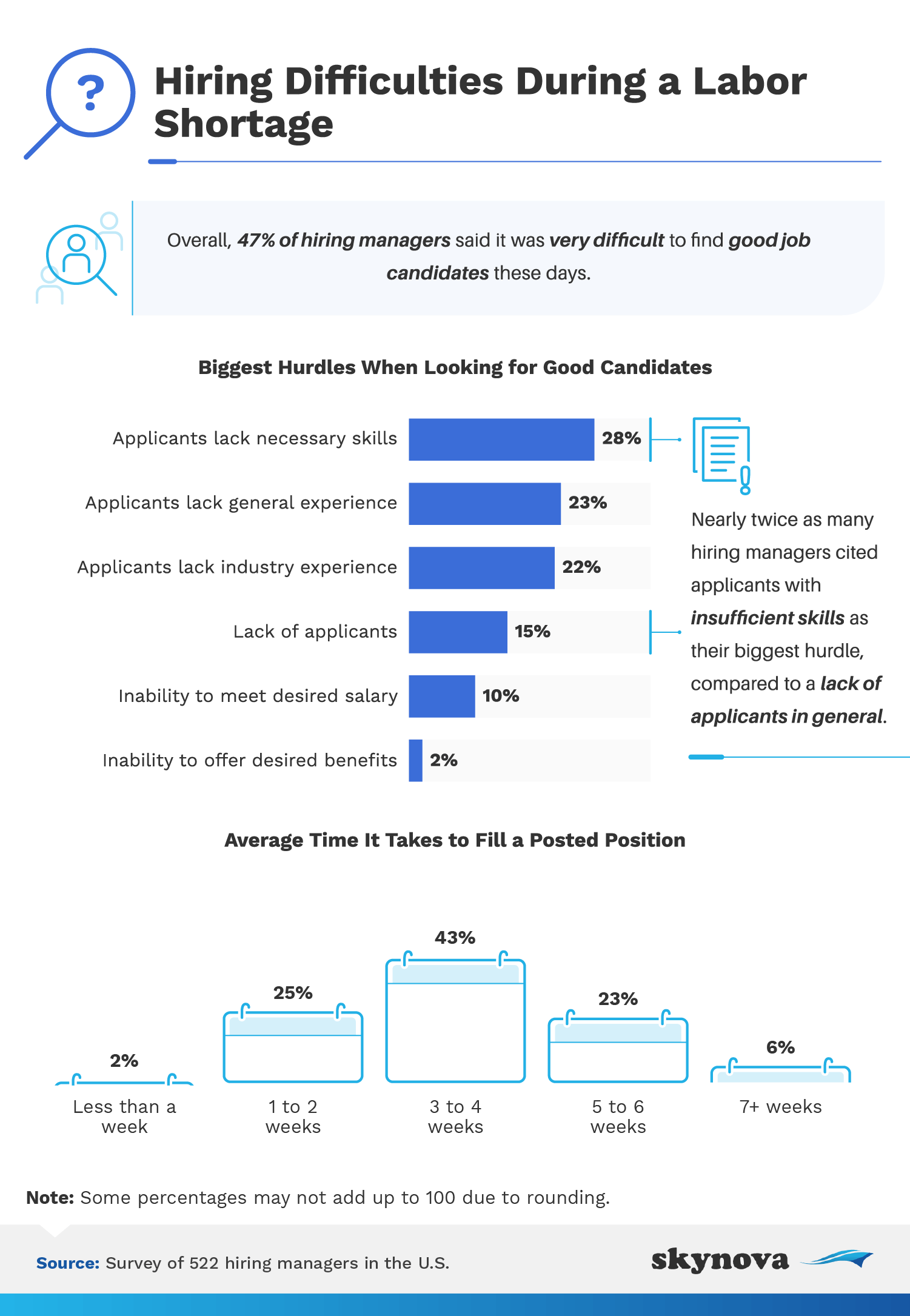
Nearly half of all hiring managers agreed that finding a good candidate was "very difficult" in today's climate. The biggest hurdle they reported was applicants typically lacking the skills necessary for the job (28%). Other challenges included a lack of general experience (23%) or a lack of industry-specific experience (22%). Encouragingly for those who are qualified, very few hiring managers failed to hire because they were unable to meet salary requirements.
Though the labor shortage suggests that an overall lack of candidates could be the biggest problem, hiring managers found this less of an issue than the lackluster quality of the applicants they did receive. In fact, only 15% of hiring managers listed too few applicants as their biggest hurdle. Only 2% of jobs are currently being filled within a week of posting their vacancy. Instead, nearly three-quarters of job postings are taking three weeks or longer to fill.
With such a wide gap between managerial hopes and applicant realities, hiring managers are having to make some compromises. The next section of our study asked respondents how likely they are to hire someone with insufficient work experience and how someone with no relevant skills at all might be considered these days.
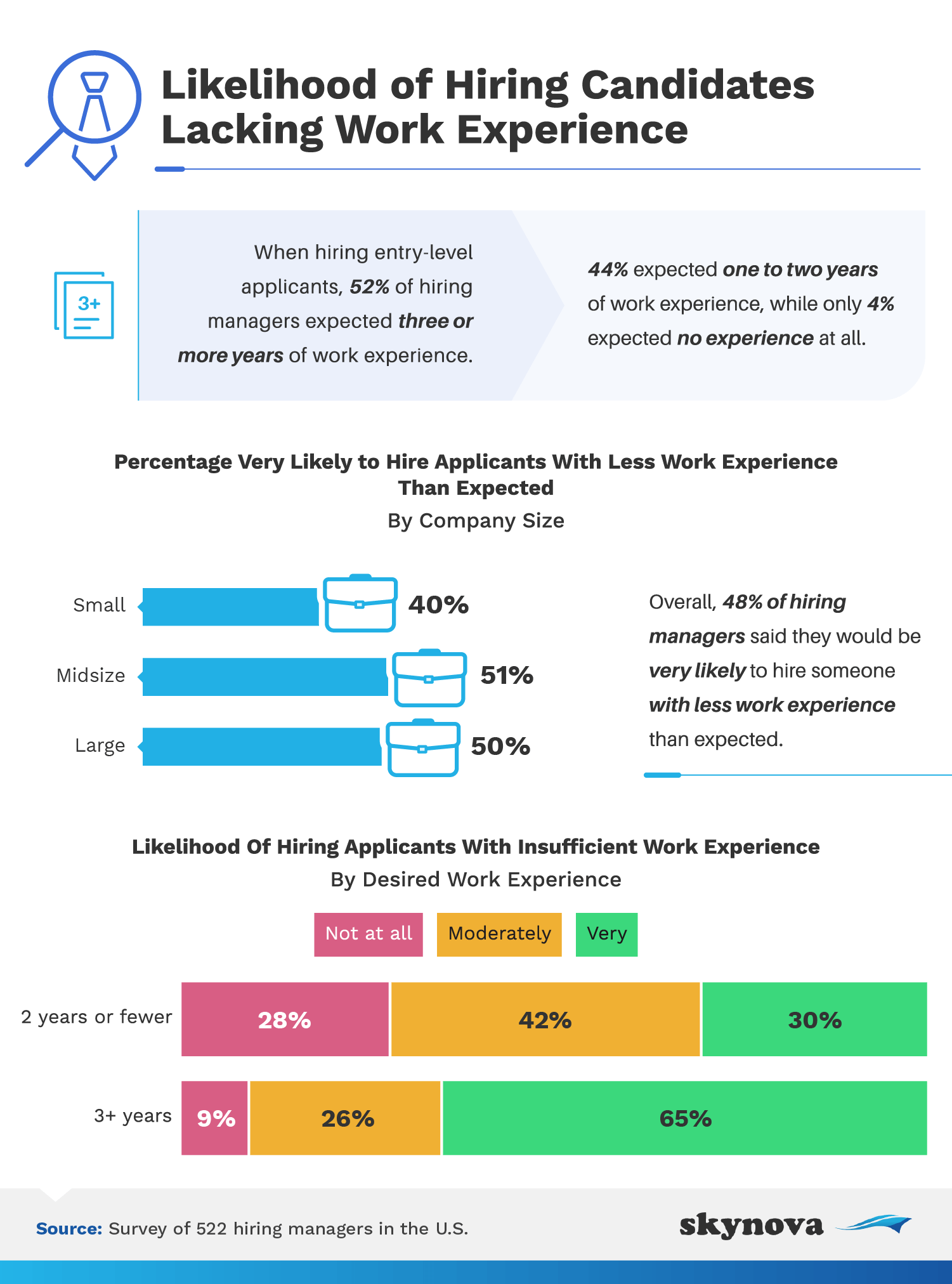
The likelihood of hiring candidates with less work experience than desired increased as companies got larger. Half of our respondents at midsize and large companies said they were very likely to hire inexperienced applicants in order to fill their vacancies. That said, the expectations of many hiring managers may have been too high in the first place. Even for entry-level positions, 52% of hiring managers ideally wanted an average of three years work experience.
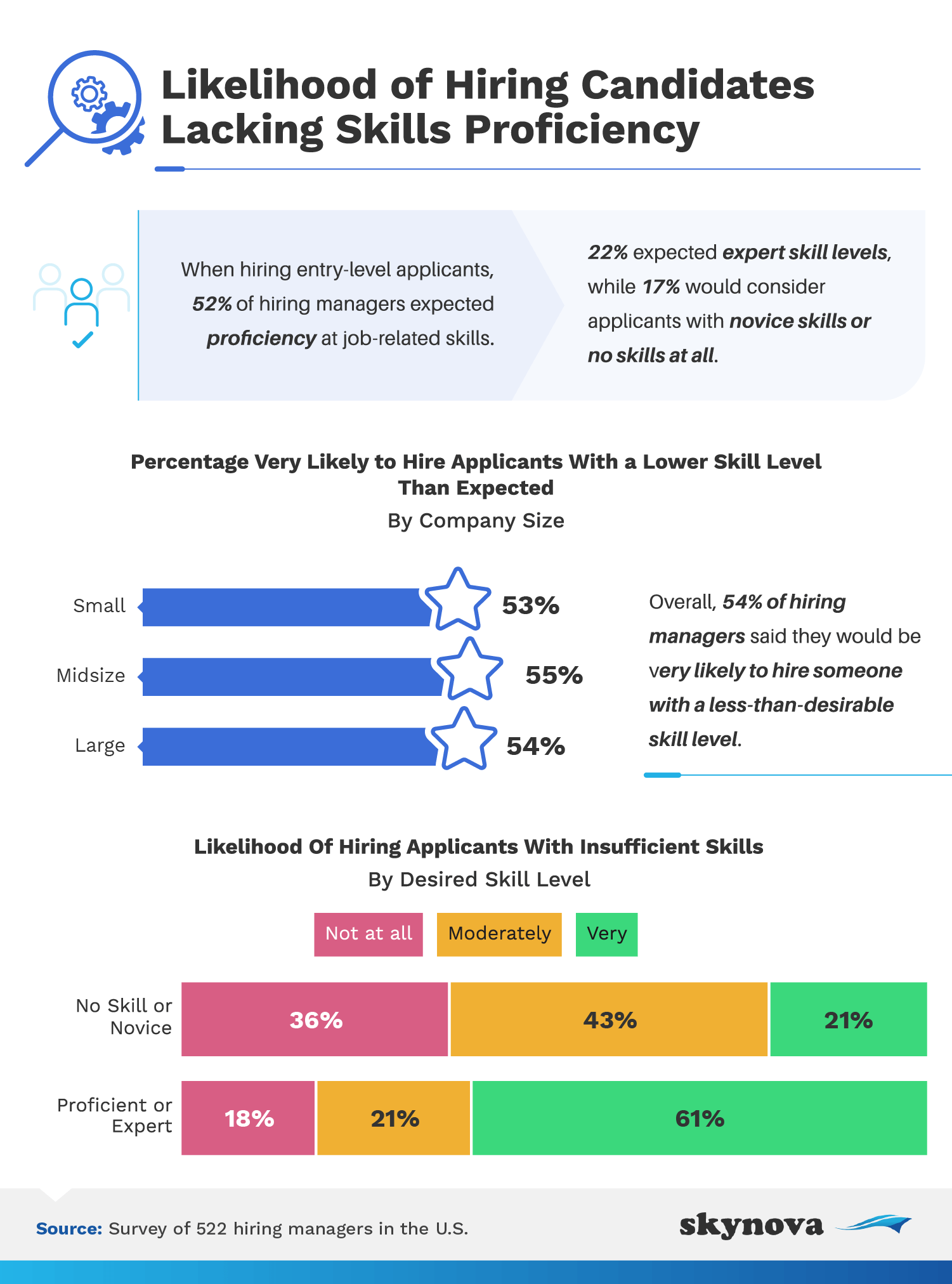
More than half of all hiring managers in 2021 were willing to offer jobs to candidates with a lower skill level than desired. While the majority wanted applicants to be proficient (52%) or even experts (22%), many would consider novice applicants and even those with no relevant skills at all (17%).
Hiring managers also shared the concerns they had about onboarding specific types of applicants. The next section of our study asked about the demographics that gave them the most pause for thought and also where they typically looked for candidates.
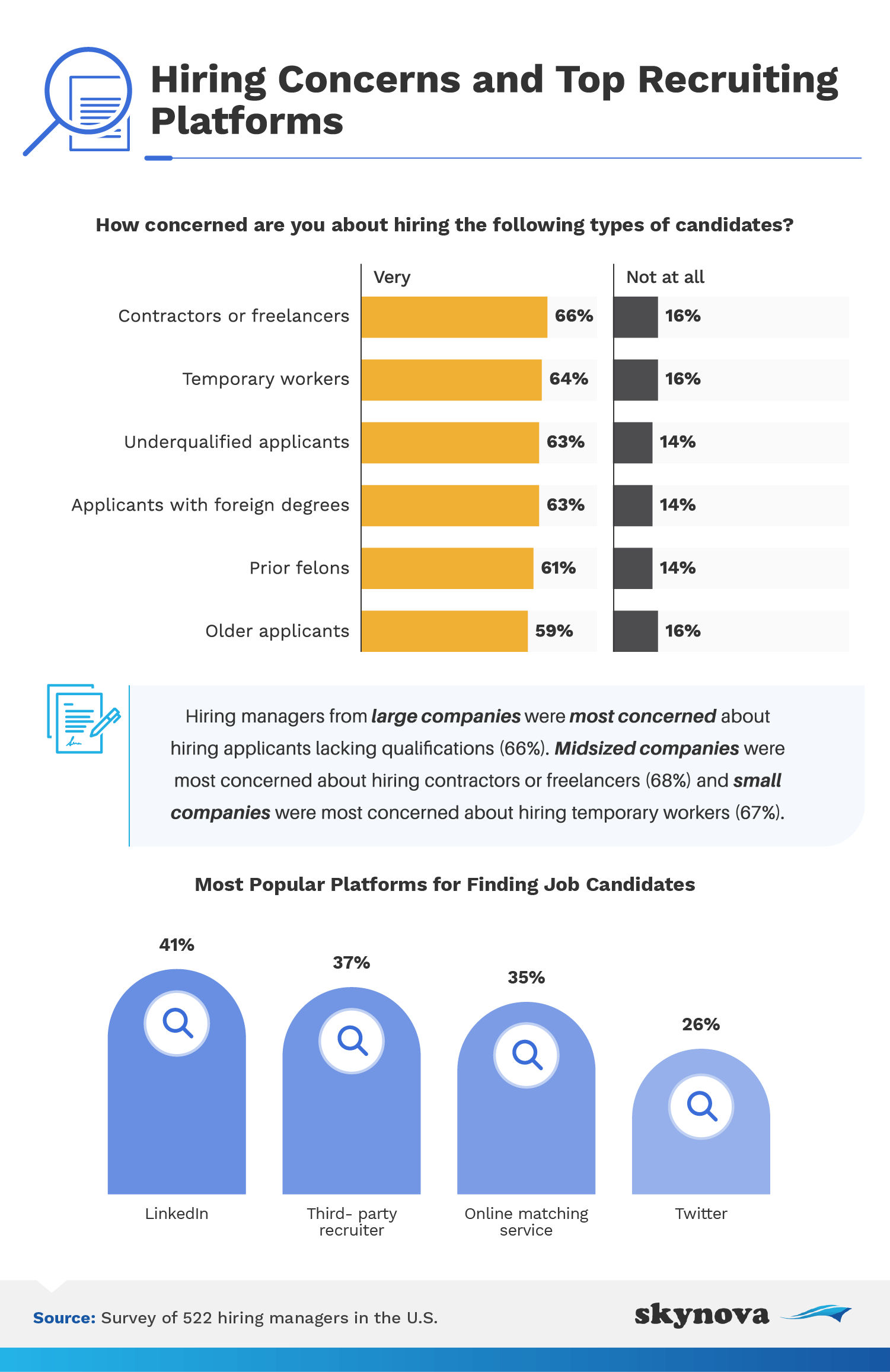
Contractors and freelancers were the biggest source of worry for hiring managers. Perhaps it was a lack of tenure or continuity that caused alarm; either way, this category of applicant was more concerning for hiring managers than older candidates or even prior felons. This high level of concern is surprising, given the well-documented rise of the freelancer during the COVID-19 pandemic . Or, maybe not, seeing as these workers represent the new status quo that is also at the root of many of the problems hiring managers are currently experiencing.
Perhaps the reason for the difficulties in finding qualified and experienced job candidates come from hiring managers' decision to turn to resources like Facebook (56%) and YouTube (53%) to search for candidates in favor of a dedicated recruiting service (37%) or online matching software (35%).
In order to successfully fill their roles, hiring managers are having to find innovative and convincing ways to get better applicants in the door. The following section of our study asked managers to share how likely they are to try specific policies to appeal to more job seekers. We looked at everything from free coffee to flexible schedules and increased salaries.
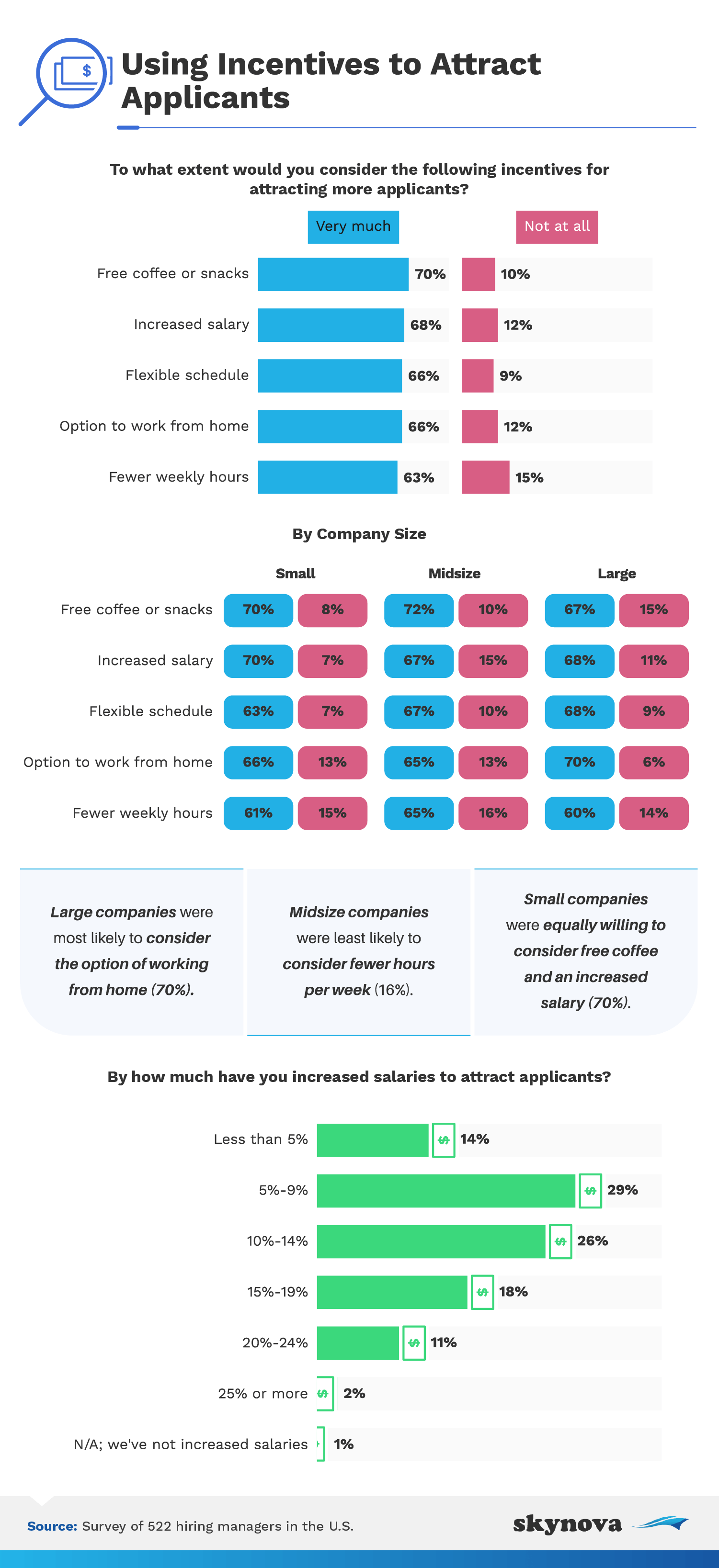
Not only were most hiring managers willing to try something simple like offering free coffee (70%); most were also extremely likely to consider incentives such as an increased salary (68%), the option to work from home (66%), or decreased hours (63%). We also found hiring managers were backing this professed willingness with actual dollars.
Only 1% of hiring managers had not increased salary offerings in the past year in an effort to entice applicants. In fact, it's a tactic being employed by all kinds of major companies, from Best Buy to Bank of America. In this study, the majority had increased salary offerings by somewhere between 5% and 14%. Only 2% of salaries enjoyed an increase of 25% or more, however.
Resume-printed qualifications certainly weren't the only thing hiring managers had in mind when making their decision. The concept of "fitting in" was very important but was also very open to interpretation.
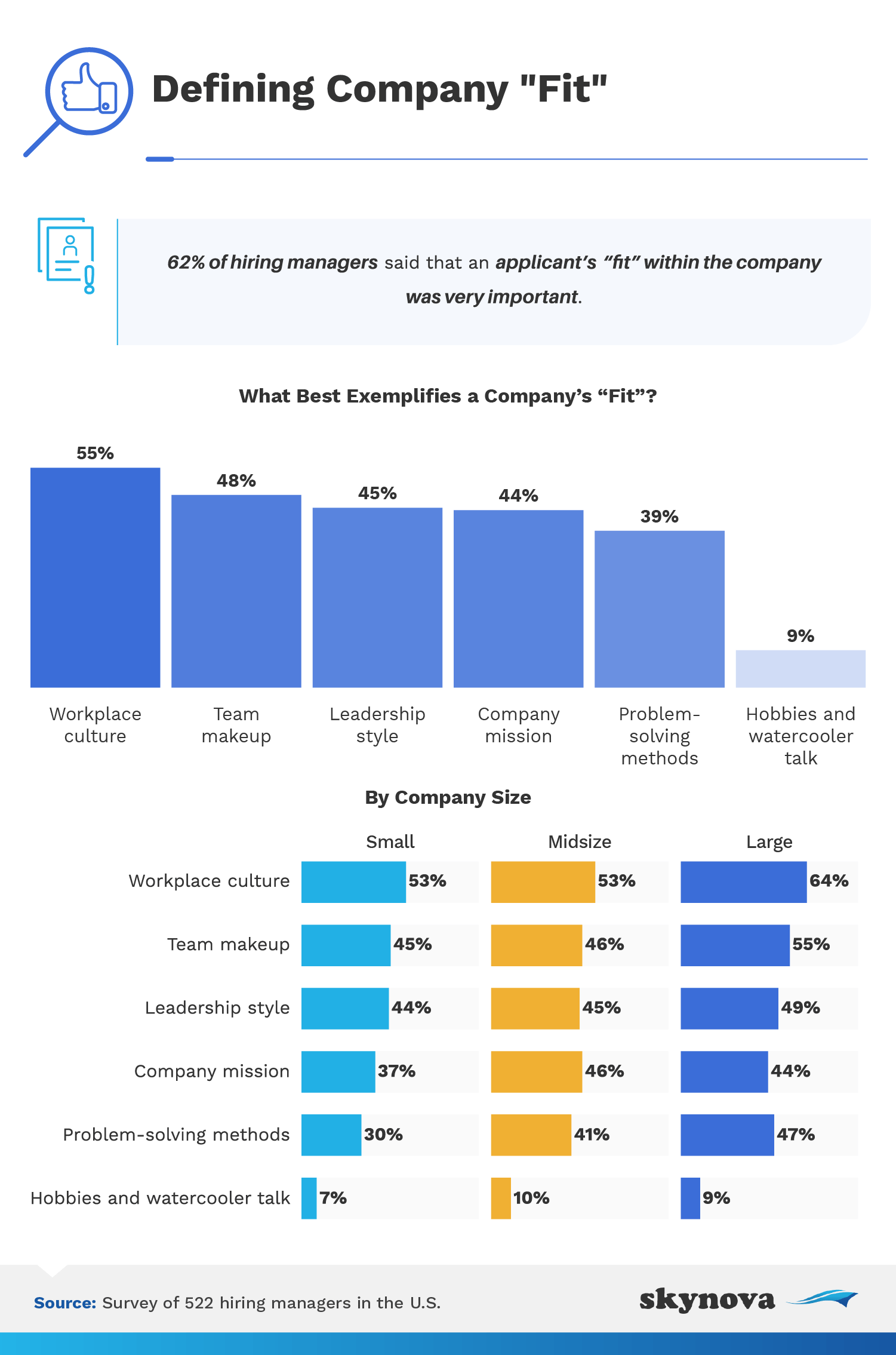
While 62% of hiring managers agreed that an applicant's "fit" was very important, far fewer agreed on the definition of what fitting in really meant. Fifty-five percent said the fit had to do with workplace culture, 48% said it depended on team makeup, while 45% mentioned a certain leadership style.
Workplace culture was the No. 1 factor when it came to fitting in at large companies, so candidates may do well to research company culture before applying. In fact, this cultural fit was more important to hiring managers than things like the company mission or even problem-solving methods. Hobbies and watercooler talk were essentially irrelevant, with only 10% or less giving them top priority when it came to fitting in.
It would certainly appear to be an applicant's market: Hiring managers are clearly disappointed with their current pool of candidates and have had to become more flexible about hiring those that are inexperienced and/or underqualified. In an attempt to attract better quality applicants, many are offering better pay and the option for flexible hours. For those seeking work, their timing couldn't be better.
On the other hand, small business owners are especially having a hard time filling their roles and often have less capital than larger businesses to compete in terms of salary. One key solution is to reimagine the manpower a company is already using to run its finances and invoicing, or highlighting workplace culture as an appealing potential "fit" for new employees.
Skynova streamlines invoicing for small businesses. Within minutes, any small-business owner can create and execute professional, dependable templates for payable and receivable accounts. There's also a 21-day free trial period in which business owners and employees can explore the 37 software modules that can help them keep things running on a daily basis. Skynova's blog also updates the business world at large with current, data-backed, and relevant research.
We used Amazon Mechanical Turk to collect responses from 522 hiring managers in the United States. Sixty-five percent of our participants identified as men, and 35% identified as women. Participants ranged in age from 21 to 68 with a mean of 37 and a standard deviation of 10.4. Those who failed an attention-check question were disqualified.
The data we are presenting rely on self-report. There are many issues with self-reported data. These issues include, but are not limited to, the following: selective memory, telescoping, attribution, and exaggeration.
The hiring market is tough enough: You can help by sharing this data on hiring managers and the approach they're taking when filling vacant company roles. Just be sure your purposes are noncommercial and that you link back to this page when doing so.